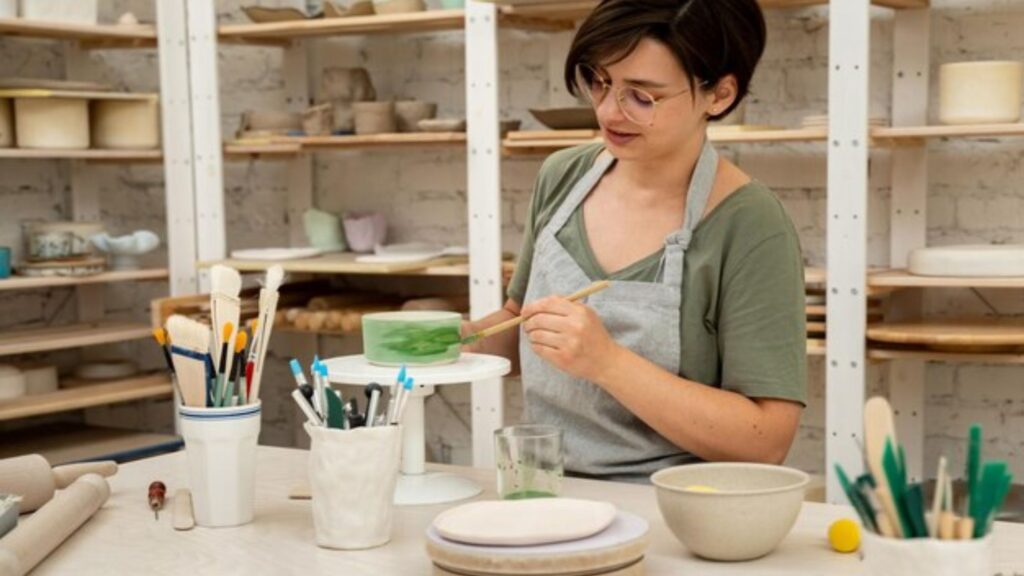Starting a home-based pottery studio business can be a great option for those who want to turn their creativity into a business. In this business, you can make pottery items like mugs, bowls, and decorative pieces with your own hands and sell them. The best part is that you do not need a big investment to start this business. In a small space, with some basic equipment and raw materials, you can start this business in the free space of your home.

Table of Contents
Initially, you can convert a room or garage in your house into a pottery studio, saving rent and additional expenses. Apart from this, you can market your products through social media and online marketplaces, which will give you a chance to reach more customers. With smart strategies and a little planning, you can start this pottery studio business successfully and gradually grow it.
Step-by-Step Process to Start a Home-Based Pottery Studio
1. Choosing the right place for the studio
Choosing the right place for the pottery studio is extremely important for the success of your pottery studio. Firstly, you need to find a place in your house that is quiet and distraction-free. This place should boost your creativity, so that you can focus and do your work without any external disturbances. A garage, spare room, or even a large balcony or roof corner can be the perfect place. The important thing is that this space is enough for your work and you feel relaxed and inspired while working.

Secondly, you have to ensure that your chosen place has adequate lighting, as pottery work is detail-oriented and requires good lighting. Natural light is the best option, so try to ensure that your studio space has windows. If there is a lack of natural light, you can use good quality artificial lights, which will make your work easier and help your products look great.
Finally, organize the space in such a way that all your tools and materials are easily accessible. A well-organized studio not only makes your work easier but also increases your productivity. Use shelving units, storage bins, and work tables to ensure that your work runs smoothly. Such an organized and calm space will play a vital role in running your pottery business successfully.
2. Gather the necessary equipment: Buy basic pottery tools and materials
To start a pottery business, you will first need basic equipment and materials. These include a pottery wheel, clay, and a variety of craftsman tools such as cutters, sponges, and finishing tools. These tools make your pottery work easy and efficient. Apart from this, you can also buy a variety of glazes and colors to enhance your creativity, making your pottery pieces even more attractive.

To buy these necessary equipment and materials, you can use a platform like Indiamart. On Indiamart, you will find a variety of pottery tools and materials options, which you can choose according to your need and budget. Here you will also get an opportunity to compare clay, glazes, pottery wheels, and other equipment as well as prices from different sellers, so that you can get the best deal for yourself.
Once you have purchased the necessary equipment and materials, arrange them in a proper place in your studio. Make sure all your tools and materials are readily available so your work can run smoothly. With the right tools and materials, you can expand your creativity and create better pottery pieces.
3. Learn pottery techniques: Take online courses or practice regularly
Learning pottery techniques is very important to master the art of pottery. In the initial stage, you should focus on understanding and learning the basic techniques of pottery. For this, you can do online courses, where experienced instructors will give you step-by-step guidance. There are many pottery courses available on online platforms, which will help you master important techniques like wheel throwing, hand building, and glazing. Through these courses, you can improve your skills and learn new designs and styles of pottery.

Apart from this, regular practice is the key to success in pottery. It is not enough to just learn the techniques, but it is also important to perfect them through constant practice. When you practice different pottery techniques regularly, your hand dexterity and your understanding of pottery will improve. Gradually, you will be able to create more complex designs and structures, which will also increase the quality of your products.
Finally, evaluate the pottery pieces you have created during practice and see which areas need improvement. Constantly challenge yourself and don’t be afraid to try new techniques. Whether it is learning from an online course or through hands-on experience, focus on every step and keep refining your art. This way, you can master your pottery techniques and take your pottery business to new heights.
4. Make Your First Pieces: Start Making Mugs, Bowls, and Decorative Items
Once you have learned the basic pottery techniques and have gathered the necessary tools, it is time to make your first pottery pieces. To begin with, it is best to make simple and basic items such as mugs, bowls, and decorative pieces. These items are a great way to practice and test your skills. Make sure you follow care and precision in your designs so that your products are beautiful and useful.

When making items such as mugs and bowls, make sure that they are consistent in size, weight, and design. It is easier to make smaller pieces in the beginning and through this you can understand your technique better. Try different designs and colors of pottery so that your pieces are attractive and full of variety. Meanwhile, pay attention to the quality and detail of your work so that your items look professional and premium.
Finally, once you have made your first pieces, dry them thoroughly and glaze them properly. After this, bake them in a cooking kiln so that they become completely solid and permanent. Seeing your first products will make you feel the hard work and improvement in your skills. Gradually, you will be able to create more complex and attractive designs, which will give a new direction to your pottery business.
5. Set up an online store: Use Etsy or social media
Once your pottery business is ready, it is important to present it on an online platform. For this, you can use platforms like Etsy, which is a popular marketplace for handmade and crafted items. To set up your shop on Etsy, you need to create a profile, upload high-quality photos of your pottery pieces, and write their descriptions correctly. This platform provides you with a large customer base and better marketing opportunities.

Also, use social media platforms like Instagram, Facebook, and Pinterest. Share photos and videos of your pottery items on these platforms, and update your followers about your new designs, offers, and discounts. Social media can prove to be an effective marketing tool for you, allowing you to market your products to a wider audience and stay in direct contact with the customer. You can also build your brand identity through regular posts and interactions.
Finally, update your online store profile regularly and pay attention to customer feedback. Make sure you fulfill all orders on behalf of your store on time and provide excellent customer service. This way, you can run your online store successfully and take your pottery business to new heights.
6. Market your products: Promote through social media and local markets
Marketing your pottery products is vital to the success of your pottery business. Social media platforms such as Instagram, Facebook, and Pinterest are an effective way to promote your products to a wider audience. Regularly share attractive photos and videos of your pottery items on these platforms, and update your followers about new designs, special offers, and discounts. Using hashtags and local groups on social media can help you promote your products to as many people as possible.

In addition, exhibiting your pottery items at local markets and artisan fairs is also an effective marketing strategy. By participating in these events, you can meet customers directly, showcase your products in person, and increase your brand recognition. Your presence at local markets can leave a lasting impression among your regional customers and also provide networking opportunities.
Finally, it is important to maintain consistency in marketing your pottery products. Once you have established your social media profiles and your presence in local markets, keep your customers engaged with regular updates and promotions. Pay attention to customer feedback and try to meet their expectations. This way you can successfully grow your pottery business and make your brand known.
7. Strengthen your skills and increase your range of products over time
To run a pottery business successfully, it is important to hone and expand your skills in the beginning. As you work on your pottery projects, you will gain more experience and confidence. Focus on the quality of the products you make and improve your techniques through constant practice. You can also attend online courses or workshops from time to time to adopt new designs and techniques that will further improve your skills.

Once you have mastered your basic pottery skills, gradually expand your range of products. By introducing new types of items and designs, you can provide new and varied things to your customers. Apart from mugs and bowls, you can also add custom pottery, gift sets, and home decor items. This way you can expand your market and attract new customers, which will make your business grow steadily.
Finally, take into account market research and customer feedback to expand your business over time. See which products are more popular and what kind of new designs or items customers are demanding. Using this information you can update your product offerings and ensure your business grows. By expanding gradually, you can run your pottery business successfully for a long time.
8. Total estimated investment in a home-based pottery studio: ₹60,000 to ₹80,000
To start a home-based pottery studio, the total estimated investment can be between ₹60,000 to ₹80,000. This investment includes arranging your workspace, pottery equipment and materials. If you use the already available home space, you will have to spend less on the workspace setup. But if you need some improvements or new furnishings, it can cost ₹10,000 to ₹20,000.

Pottery equipment and materials are a significant part of the expenditure. A basic pottery wheel can cost ₹15,000 to ₹30,000, while a small kiln can cost ₹30,000 to ₹70,000. Additionally, raw materials such as clay, glaze, and basic tools can cost ₹5,000 to ₹20,000. If you take courses to learn new techniques, budget for it is ₹5,000 to ₹15,000.
There will also be expenses on marketing and sales setup, which can cost ₹5,000 to ₹10,000 for launching and promoting an online store. Other essential expenses include packaging, shipping, and emergency expenses, which can range from around ₹5,000 to ₹10,000. Overall, taking all these expenses into account, your total investment amount can be between ₹60,000 to ₹80,000, which will be enough to successfully start a small pottery studio.
9. How much can you earn from this business: A detailed analysis
Your earnings from pottery business depend on the quality of your products, marketing strategies, and customer base. If you make high-quality pottery and market it correctly, you can earn ₹20,000 to ₹50,000 per month. Initially, when your business is new, you need to focus on the price of your products and the sales volume so that you can get off to a good start and win the trust of customers.

As your business grows and you expand your range of products, your earnings will also increase. Adding new designs and products can help you attract different customer segments. Also, if you actively participate in online marketplaces like Etsy or local markets, you can reach more customers, which will increase your sales. Thus, your monthly earnings can reach ₹50,000 to ₹1,00,000 once you have a strong customer base and stable sales.
Ultimately, your earning level will depend on the growth of your business and the efforts you put in. Regular customer feedback, market research, and paying attention to the quality of your products can help you steadily increase your sales and ensure the success of your business. Also, if you offer seasonal or special collections, you can earn additional income during festivals and special occasions.
Conclusion
In conclusion, a home-based pottery studio is a low-cost business that gives you the opportunity to take your creativity to a whole new level. With proper planning, the right equipment, and the right use of online platforms, you can turn this small business into a huge success. Slowly, your handmade art will win over your customers, and your pottery studio will make a name for itself.
If u want to Watch the Video You can visit to our You tube Businovations Channel and watch the video……
Click the link to read the Recent Posts….
Start a handmade furniture business with High profit (273)

